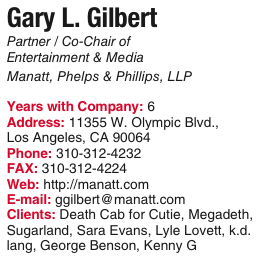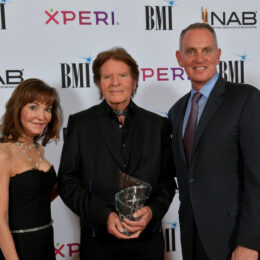BACKGROUND: Gary Gilbert was a journalism major at the University of Missouri for just one year before shifting gears and falling into law, then serendipitously becoming a music attorney. While he’s helped nurture acts into megastars, Gilbert continually works with young artists.
Finding His Career
I went to law school for one reason: so I didn’t have to make a decision about being a grownup for three more years. My father was a businessman, so I figured if I don’t like this law thing I’ll be the boss’ son. But my father screwed that up by dying.
That was the first time I realized, as a second year law student, that oh, I guess I have to be a lawyer. I was able to get a job at one of the prestigious Westside law firms as a litigator, didn’t like it and decided I didn’t want to do this anymore. The firm said, we don’t want you to leave. Why don’t you try the corporate department?
So I became a corporate lawyer for about three-and-a-half, four years. I didn’t hate it or anything; I just didn’t like it. Then a guy who did music came into the firm. He wanted a lawyer in the corporate department to do music-related stuff and nobody else wanted to. I’ve always loved music, so I started working with him and found I liked it.
Creative Spark
Shortly after that, a friend from law school said, hey, there’s this guy starting a new firm that’s music only. Do you want to talk to him? They made me an offer and I became a music lawyer. Not only could I tolerate being a lawyer, but also I really liked it. I like the creative part of it. I still never loved the lawyer part, but I always loved the music. So I stumbled into it, but I’m happy I did, because if I didn’t, I don’t know what I’d be doing. I’d like to say I knew I wanted to be a music lawyer, but that wouldn’t be true. I planned to be a creative writer. The law enabled me to be around the music business and that’s what I still like about it. I’m not tired from that at all yet. I’m still invigorated by it.
Experienced Supervision
I do pretty much everything. I do mainly artists, but I also represent some managers, producers, songwriters, small record companies and executives. Tangentially, I do TV, film, branding, all that other stuff, but we have other people at the firm who do that as well. I specialize in music, but I have a background in litigation and corporate, so if a client gets sued I’m the one who supervises that.
Get Moving
I’m looking for people who are self-starters. The people who are winning today are entrepreneurial. It’s a lot different than it used to be. I like the way it is today, because there are more opportunities. And there are many different ways to get there.
It’s the same with A&R people. If you present a CD to an A&R person, chances are they’re going to want to know what the story is. Even if the CD is great, they want the train to be moving before they jump on.
Your Album’s Just a Springboard
The record deal today is sort of the engine that drives the rest of the career. It’s no longer the end; it’s a means to an end. The record deal enables you to do all the other stuff: the branding, the touring, the merch, the digital stuff, book deals, reality TV deals, whatever. You don’t do a record deal and assume you’re going to go triple platinum. Those days are over. You’re trying to build a career, not just be a recording artist.
Balanced Incentives
In general, a record company presents you with an agreement draft and you try to whittle that down. It’s about maximizing the benefit to the artist and minimizing what the record company takes, while still enabling the record company to have an incentive to market the artist. The record company will tell you it needs pieces of all these other areas in order to market the artist. I don’t necessarily dispute that, but I try to minimize that so you not only incentivize the record company to work with the artist but also maximize what the artist takes out of the deal. My approach is tailored to the given situation. I want the record company to feel good about the artist and don’t want them to have a bad taste in their mouth about the negotiation.
The Right Branding for the Right Artist
You try to get a brand that is relevant to the artist and reflects that artist’s image. Everybody knows about branding, but it’s a very hard area to get into. Branding is a different demographic than the record buying public, so you’re dealing with companies, retailers, people who maybe understand the recording artist or maybe they don’t. So whether it’s vodka or a car or whatever, it has to be tailored to that artist and enhance the value of that artist in the public’s eyes. A lot of these deals have done well and some haven’t. It’s a very subjective thing, but when it works it’s beautiful.
Small But Powerful:
We’re a full-service law firm. We do everything you’d want: estate planning, corporate, all the stuff involved with general legal needs. But by the same token, our department functions like a boutique. It’s a very concentrated department. I’ve been in law firms where, if I need to sue somebody I have to refer that business to another firm. I don’t like my firm suing a record company; I think it’s bad business. But we have the expertise to do anything.
One of my clients is Sugarland and in 2011 there was a disastrous stage collapse in Indianapolis. I’ve been working in conjunction with our insurance lawyer since that time. If I didn’t have her in my firm, I would have had to retain somebody at a different firm to do the work. So the client gets the benefit of my involvement plus somebody I trust and work with on a daily basis to help that situation.
Satisfying Success
It’s very satisfying when you represent an artist who is playing The Roxy one day and Madison Square Garden another.The first time I saw k.d. lang perform was probably 1987. I didn’t know if she’d sell records. All I remember is I thought, wow, this person is really talented and someone I’d love to work with. Then I got the opportunity to do so and it’s been very satisfying (these last 30 years). But I never knew—would she sell a lot of records? All I knew was she was incredibly talented. That’s how I approach things. It’s not a matter of, well, how much money are they going to make me? I look at the creative aspect and assume everything else is going to take care of itself.
The Well-Rounded Attorney
If somebody wants to be a music lawyer, they’re best served getting other kinds of experience, because when you’re an entertainment lawyer you’re kind of full-service. If your client gets sued and you don’t understand the process of litigation, I don’t know how you supervise it. You turn it over to a litigator and then you have to rely on that person to do the right job. I have an idea whether somebody’s good or bad at their job, because I’ve done it. So, if you can be patient enough, get other experience. There are all sorts of things artists do besides touring and making records.










